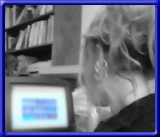|
Current Special 20th Anniversary Issue Editors
And
here is where I think we are early in the 21st century, as we celebrate
the first 20 years of the journal, and as we look forward to the 20th
Computers & Writing conference: First, I think there is a we here,
and that in itself is something to rally around. We are not an anchorless
subfield of composition studies, or a distant and often excluded cousin
of rhetoric. Instead, we are a vibrant collective that contributes
to and poses challenges toward dominant discourses in our institutions
and in our intellectual lives. I felt this we-ness very poignantly
as Heidi McKee and I read the submissions and then the final-version
articles featured in the two 20th-anniversary issues of the journal. Second,
I firmly believe we are at a pivotal point in the journal’s life
and livelihood, a point at which we both need to reexamine existing
technologies and to broaden our discussions of emerging technologies.
We need to dig even more deeply into those technologies that have
become comfortable to us, have become perhaps ubiquitous or even transparent
in our everyday lives. It is far too easy to be seduced by computers,
to be lulled by their interfaces, to forget the power they hold over
our work and our teaching. And we need to broaden our discussions
beyond computers. We now use a wide range of technologies to write,
to compose, and to communicate—a variety of devices that we aren’t
often enough taken into account as we study and theorize the impact
of technology on writing. Third, I think it’s crucial that we not leave behind issues of gender, embodiment, and identity. Hopefully, many of you are rolling your eyes as you read this. Hopefully, many of you are thinking “how could we leave behind these crucial aspects of our lives?” And this is perhaps not a direct chastisement of Computers and Composition, but rather a warning to us all. A colleague, Kristin Arola, noted at a recent conference the absence of titles and sessions related to gender issues, feminist negotiations, embodied perspectives, and identity theories. We must, as a community, continue to critically engage and analyze the intersections of existing and emergent technologies and gender, embodiment, identity, class, race, and all the other orbiting variables that shape and influence our lives.
 Heidi
McKee, University of Massachusetts Heidi
McKee, University of Massachusetts Before I began my graduate studies, I taught composition with computers for several years in secondary schools. Although I'd like to think that my pedagogy was consciously informed by research and theory, much of what I did with my students was more along the lines of "oh, cool, what else can we do with this?!" So it was with much delight—and relief—that upon beginning my doctoral work, I discovered Computers and Composition. I
was drawn to the journal immediately. First because in its pages I
sensed that I had, at last, found a community who, like me, felt passionately
that computers do matter for composition, for English studies, for
education, and for our society. Second, I was struck by the diverse
range of perspectives, approaches, and issues pursued in the journal.
And, third, I was—and am—drawn to the journal because of
the important balance contributors strike between enthusiastic hopes
(hopes that I think fuel all of our work) and critical perspectives
that continually remind us of the many ways computerized technologies
perpetuate educational, social, and political inequities. It
is my hope that in the next 20, 30, 40 years that Computers and
Composition and Computers and Composition Online continue
to provide a forum for critical examination of diverse issues surrounding
computers and writing. As we question and re-envision what writing
and the teaching of writing mean in computerized environments, it
is important that we continue to develop and analyze the theoretical
and pedagogical perspectives from which to reflect on where we've
been and to shape where we may be heading. As
new technologies continually evolve, the possibilities for teaching,
researching, and theorizing grow even broader. Directions I see for
future research include examining more fully the collaborative writing
possibilities of new technologies (e.g., Wikis, Blogs, IM, interactive
new media works); the continued examination of issues of diversity
and identity online and in computerized writing environments; the
development of more intensive discussions of research methodologies
and ethics in the computers and writing community; and the investigation
of the increasingly cyborg nature of our writing and being. (As Michelle
Sidler points out in the 20th anniversary issues, biotechnology has
and will impact computers and writing.) But
I also think it important that in the continually movement to the
"new" we not forget seeming "older" technologies,
ones that are often treated as transparent but which still have profound
effects upon how we and our students write, interact, and construct
how we know and perceive ourselves, our relationships, and world events.
There are many questions still to be asked (and re-asked) of such
"older" technologies as word-processing software and email,
particularly in light of more critical perspectives that have emerged
in the 1990's. I
also think it's important that we examine the impact of computerized
technologies on broader institutional levels. Much of the work in
Computers and Composition, although grounded in theories informed
by broader perspectives, has been drawn from authors' individual work
in one particular classroom or on one particular campus. I think it's
important that we work to pursue research that analyzes computers
and writing across institutions and that provides data about the field
in general that we can then use to more fully examine particular settings.
Whether at the individual, classroom, or institutional-level, there
are innumerable questions to be asked in and about the broad field
of computers and composition. It is up to us to develop and pursue
these questions and to work to ensure that all persons have equitable
access to pursue the answers. |
|
 Dànielle
Nicole Devoss, Michigan State University
Dànielle
Nicole Devoss, Michigan State University